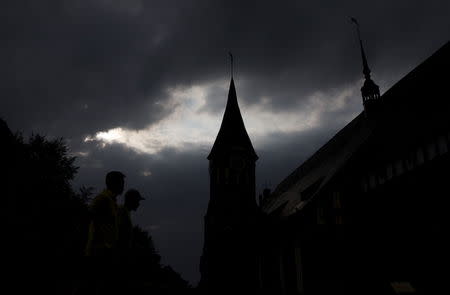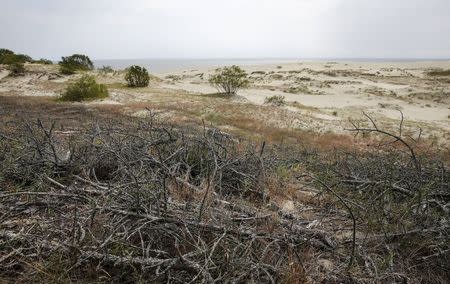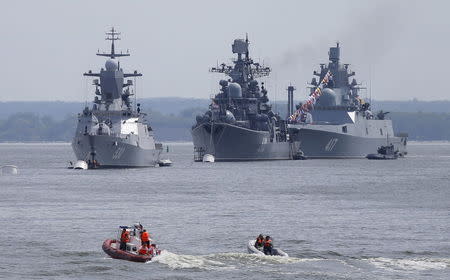Kaliningrad's 'desert' stadium will be ready, says city boss
By Mike Collett KALININGRAD, Russia (Reuters) - The scene looks more like a building project for the 2022 Qatar World Cup rather than Russia's 2018 finals, with a flat sandy landscape stretching out to the far horizon. While construction work has yet to start on the delayed Baltika Arena stadium in Russia's Baltic Sea exclave, at least the land on which it is to be built has been made stable with 4.5 million tonnes of sand imported from quarries around Russia. The project on Oktyabrskiy Island, by the Pregolya River, appears out of synch with the rest of Russia's preparations for the World Cup. Building work on the remainder of the 12 venues due to stage matches in 11 cities is either complete or well under way but not in Kaliningrad, bordered by Poland and Lithuania and with no land connection to the rest of Russia. Alexander Rolbinov, deputy governor of the Kaliningrad regional government, agreed appearances were disconcerting. "You're right, it does look more like Qatar than Russia, it does not look like a normal place here, but we had to bring in the sand to make the earth secure because we are building it on an island in the middle of a river and the earth was very unstable," he told reporters on a tour of World Cup venues. "The sand was all delivered by last October, and although the ground is now safe to take the weight stresses of the stadium, the stadium itself was re-designed as a smaller 35,000 seater stadium, losing 10,000 seats from the original design -- and also losing the planned retractable roof." DESOLATE LANDSCAPE Rolbinov said he was not worried about the pace of progress. "Because the stadium is smaller, and there will be no roof, it will take less time to build and we are in no doubt it will be finished on schedule by the end of 2017. We are absolutely confident of that," he said. Kaliningrad, once German and with a rich and varied heritage, is 1,200km from Moscow and due to benefit from the World Cup with a renovated airport, new roads and the opening up of border posts. The stadium will probably become home to Baltika FC, currently in the Russian second division, and will also be a cultural and social centre built on the only available land close to the city centre. "That was at the heart of the problem," said Rolbinov. "We wanted the new stadium in the heart of the city, not far out of town, and this was the only available site. But we have overcome the problems and the dream will soon be a reality." After the final prepatory ground tests, work is due to start on the stadium at the end of July. Contractor Crocus Group are confident the project will be finished on time even though it had to redesign the stadium after the original building firm Mostovik, which built venues for the 2014 Sochi Olympics, was declared bankrupt. "We were asked to create a new concept, as the original was very expensive," said Crocus Group President Aras Agalarov. "We removed the retractable roof which was originally planned and got rid off unnecessary spaces. Agalarov said the stadium construction would cost around 17.5 billion roubles (£11.23 million) despite the expensive ground works to combat the high water table and the weaker rouble, hit by Russia's economic downturn. Roblinov said the final cost of the stadium had not yet been finalised, but would not be more than 15.0 billion roubles. The two men were in agreement on one important issue, however. "No one should have any doubts that we will build this stadium," said Agalarov. "We don't consider 'not having enough time' an option." (Additional reporting by Dmitriy Rogovitskiy and Jack Stubbs in Moscow, editing by Alan Baldwin)

 Yahoo News
Yahoo News 








